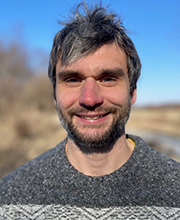 Purdue University - Extension - Forestry and Natural Resources
Purdue University - Extension - Forestry and Natural Resources
Peter T Euclide

Forestry and Natural Resources
Research Associate
Phone:
765-494-9717
Office:
FORS Room 206
Address:
195 Marsteller Street,
West Lafayette IN, 47906
West Lafayette IN, 47906
Email:
Website:
Why Extension?
Tell us about your background?
As a research biologist I study a combination of modern genomic techniques and ecology to answer questions related to animal movement, local adaptation, and evolution to inform management and conservation. Much of the research focuses on investigating the population genetic structure and local adaptation of fishes in the Great Lakes including walleye, lake trout, perch, and alewife.
How did you come to work in aquatics ecology? What do people need to know about it?
I started working in aquatic ecology by doing undergraduate research at Kent State University on stream macro invertebrates. From there I went to graduate school in Vermont and began working on the ecology and evolution of fish and invertebrate populations in large freshwater lakes. I have always been interested in how research can help to inform how we manage and protect species in their natural environment.
How did you get involved with FNR Extension and outreach?
My primary position at Purdue is conducting aquatic ecology research on fish populations in the Great Lakes and Indiana. As part of my role at Purdue, I also work with Illinois and Indiana Sea Grant as a fisheries specialist conducting extension and outreach about topics important to the Great Lakes.
What do you enjoy most about your work?
I have always enjoyed working with people to identify new scientific questions and to develop research projects that help to address them. But even more than developing projects, I enjoy the process of seeing research go from start to finish and working with students and colleagues to go from a idea that came up over coffee to a final publication or presentation years later.
What is the biggest challenge you face in your job?
One of the biggest challenges I face in my job on a daily basis is dealing with the ever increasing quantities of data that are being generated with new scientific approaches. I frequently work with large genetic data sets containing hundreds of thousands to millions of data points.To make sense of these data I often have to spend hours organizing data and working with statistics when I would rather be outside sampling or working with people.
What part of your job did you least expect to be doing?
Honestly, working with extension and outreach. I have spent most of my career working on conducting research and so have not always had opportunities to translate my experiences outside of the research-world. I have always enjoyed working to make research more accessible and so look forward to having opportunities to do more extension work in the future.
Do you have an outside hobby?
Many. I love bike riding, gardening, cooking, hiking, and rock climbing. While I love fish, and do consider fishing a hobby, I often do not get out fishing as much as one might assume.